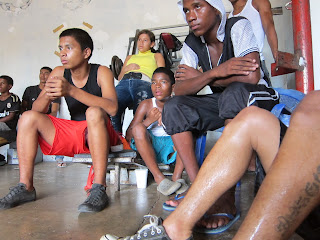What is extraordinary? The ordinary.
Closing in on nearly 2 months of living in Panama and working with Floating Doctors I am finding that this place feels kind of ordinary now. Of course it is not, but I am not shocked by things as much any more. Which as led to my joking around for the past few days about how Ngobe I am becoming. For example, walking home with groceries on my head - how Ngobe of me; caring a little bit less about having a bug crawling on me - how Ngobe of me; not being upset about having to walking around the city barefoot because my sandal broke- that's my Ngobe side just coming out to say hello.
But adaption has its draw backs. (I am hoping that worms is not one of them). Including that I see less details or at least they are not as striking and as crisp as they were when I was just starting here. The culture becomes a backdrop and less of a source of wonder.






